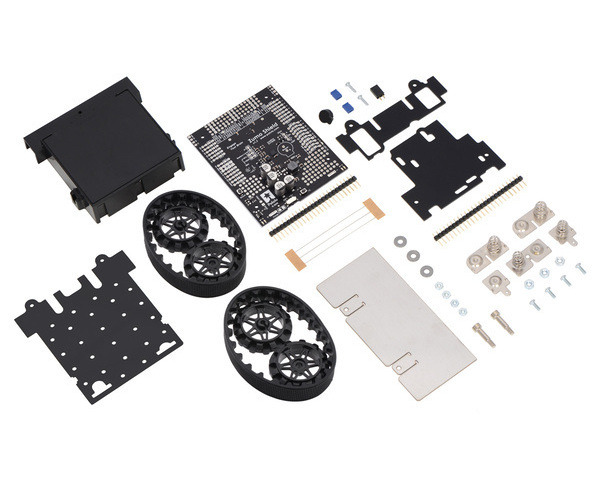Robot Kits » Zumo Robots and Accessories » Zumo Robot for Arduino »
Zumo Robot Kit for Arduino (No Motors)
This kit contains most of the parts you need to build an Arduino-controlled Zumo robot. It consists of a Zumo Shield for Arduino, a Zumo chassis kit, and a Zumo blade. You will also need a pair of micro metal gearmotors, four AA batteries, and an A-Star 32U4 Prime or Arduino to complete your Zumo robot (motors, batteries, and Arduino sold separately). This product is a kit; assembly (including soldering) is required.
 Compare all products in Zumo Robot for Arduino or
Compare all products in Zumo Robot for Arduino or  Robot Kits with Soldering or
Robot Kits with Soldering or  Shields for Arduino or
Shields for Arduino or  Zumo Kits and Robots.
Zumo Kits and Robots.
| Description | Specs (0) | Pictures (5) | Resources (22) | FAQs (0) | On the blog (3) |
|---|
Documentation and other information
-
Pololu Zumo Shield for Arduino User’s Guide (Printable PDF)
User’s manual for the Pololu Zumo Shield for Arduino.
File downloads
-
Schematic diagram of the Zumo Shield for Arduino, v1.3 (183k pdf)
-
Schematic diagram of the Zumo Shield for Arduino, v1.2 (449k pdf)
-
Zumo Shield front expansion pinout (552k pdf)
-
3D model of the assembled Zumo Robot for Arduino (v1.3 Shield) (35MB step)
This model uses simplified models of the control electronics to reduce the file size. More detailed models are available separately of the Zumo shield for arduino, v1.3 (17MB step) and Zumo reflectance sensor array (5MB step).
-
3D model of the assembled Zumo Robot for Arduino (v1.2 Shield) (33MB step)
This model uses simplified models of the control electronics to reduce the file size. More detailed models are available separately of the Zumo shield for arduino, v1.2 (13MB step) and Zumo reflectance sensor array (5MB step).
-
Dimension diagram of the Zumo Shield for Arduino, v1.3 (657k pdf)
-
Dimension diagram of the Zumo Shield for Arduino, v1.2 (467k pdf)
-
3D model of the Zumo Shield for Arduino, v1.3 (17MB step)
-
3D model of the Zumo Shield for Arduino, v1.2 (13MB step)
-
Guide utilisateur du Robot Zumo Pololu (2MB pdf)
Un guide complet pour assembler, utiliser et exploiter rapidement votre Robot Zumo (version 0.1). Note: This French translation of our Zumo Robot for Arduino user’s guide was made by our distributor MCHobby.
Recommended links
-
Zumo Shield Libraries
This collection of libraries and examples for the Arduino that make it easy to program an Arduino-controlled robot built with Pololu’s Zumo Shield or Zumo robot kit (also available fully assembled).
-
LSM303 Arduino library
This is a library for the Arduino that interfaces with our LSM303D, LSM303DLHC, and LSM303DLM 3D compass and accelerometer carriers as well as the compass and accelerometer ICs on the MinIMU-9 v3 and AltIMU-10 v3 (it also works with older versions of those boards, some of which used the LSM303DLH and LSM303DLHC). It makes it simple to configure the device and read the raw accelerometer and magnetometer data, and it has a function for computing the tilt-compensated heading for those looking to use the LSM303 as a tilt-compensated compass.
-
L3G Arduino library
This is a library for the Arduino that interfaces with our L3GD20H and L3GD20 3-axis gyro carriers as well as the gyros on the MinIMU-9 v3 and AltIMU-10 v3 (it also works with older versions of those boards, some of which used the L3G4200D and the L3GD20). It makes it simple to configure the device and read the raw gyro data.
-
Simulink Library for Zumo Robot
This library can be used to program an Arduino-controlled Zumo through MATLAB and Simulink. It provides driver blocks for all the sensors present on the Zumo Robot as well as example models showing their usage.
-
How to program a Zumo robot with Simulink
This tutorial on the Adafruit Learning System guides you through the process of programming a Zumo robot with Simulink.
-
MicroPython library for the Zumo Robot with pyboard or Raspberry Pi Pico
This MicroPython library from Pololu distributor MC Hobby allows a MicroPython pyboard or Raspberry Pi Pico to control a Zumo Robot for Arduino. MC Hobby has adapter boards that let you easily connect either controller to the Zumo Shield. Documentation is available in both French and English.
-
Pixy Pet Robot tutorial: adding color vision to the Zumo Robot for Arduino with a Pixy CMUCam-5
This tutorial from Adafruit shows how to pair a Pixy CMUCam-5 vision system with the Zumo Robot for Arduino to enable it to chase objects or follow you around.
-
Zumo robot tuning tips
This article was written by Professor Erich Styger for his class on embedded systems programming at the Lucerne University of Applied Sciences and Arts. It describes various ways to tweak the performance of a Zumo to be more competitive in a Mini Sumo competition. Note that his Zumos use a custom PCB rather than our Zumo shield for Arduino; our shield has a lot of capacitance in parallel with the batteries that generally prevents the “battery inertia” problem Erich describes.
-
Using the L3GD20 gyroscope in control systems
This is a YouTube playlist by control systems lecturer Brian Douglas that uses the L3GD20 MEMS gyroscope. It describes the fundamentals of the gyro and how to use it for closed and open loop control projects with MATLAB/Simulink and Arduino.
-
Freedom Zumo Robot
This robot is uses our Zumo robot kit, 75:1 micro metal gearmotors, and a Zumo reflectance sensor array. Instead of an Arduino it uses a Freescale FRDM-KL25Z as the microcontroller board, and sample code is available for line following and maze solving. By Erich, March 2013.
-
Texas Instruments DRV8835 motor driver datasheet










































